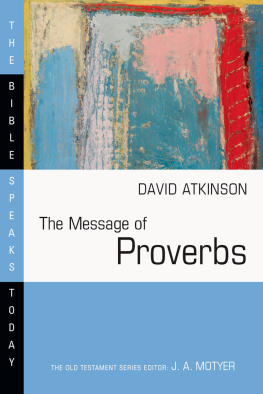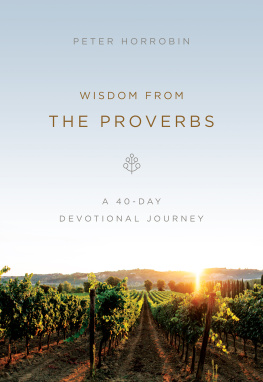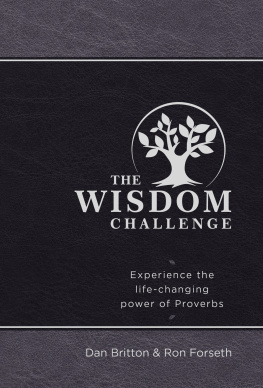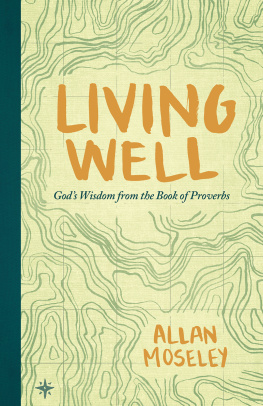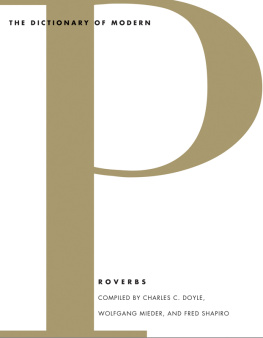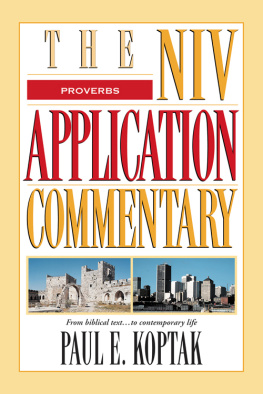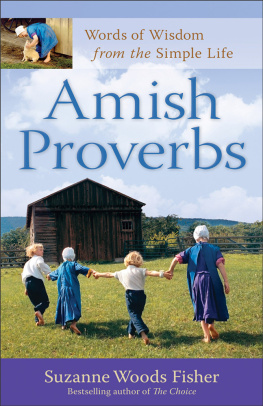The Bible Speaks Today
Series Editors: J. A. Motyer (OT)
John R. W. Stott (NT)
The Message of Proverbs
Wisdom for life
THE BIBLE SPEAKS TODAY
The Message of Proverbs
Wisdom for Life
DAVID ATKINSON
InterVarsity Press, USA
P.O. Box 1400, Downers Grove, IL 60515-1426, USA
World Wide Web: www.ivpress.com
Email:
1996 by David Atkinson
All rights reserved. No part of this publication may be reproduced, stored in a retrieval system or transmitted in any form or by any means, electronic, mechanical, photocopying, recording or otherwise, without the prior permission of InterVarsity Press.
InterVarsity Press, USA, is the book-publishing division of InterVarsity Christian Fellowship/USA, a student movement active on campus at hundreds of universities, colleges and schools of nursing in the United States of America, and a member movement of the International Fellowship of Evangelical Students. For information about local and regional activities, write Public Relations Dept., InterVarsity Christian Fellowship/USA, 6400 Schroeder Rd., P.O. Box 7895, Madison, WI 53707-7895, or visit the IVCF website at .
All Scripture quotations, unless otherwise indicated, are taken from the Holy Bible, New International Version. NIV. Copyright 1973, 1978, 1984 by International Bible Society. Used by permission of Zondervan Puhlishing House. Distributed in the U.K. by permissicn of Hodder and Stoughton Ltd. All rights reserved. NIV is a registered trademark of International Bible Society. UK. trademark numher 1448790.
ISBN 978-0-8308-8309-7 (digital)
ISBN 978-0-8308-1239-4 (print)
This digital document has been produced by Nord Compo.
General preface
The Bible Speaks Today describes a series of both Old Testament and New Testament expositions, which are characterized by a threefold ideal: to expound the biblical text with accuracy, to relate it to contemporary life, and to be readable.
These books are, therefore, not commentaries, for the commentary seeks rather to elucidate the text than to apply it, and tends to be a work rather of reference than of literature. Nor, on the other hand, do they contain the kind of sermons which attempt to be contemporary and readable without taking Scripture seriously enough.
The contributors to this series are all united in their convictions that God still speaks through what he has spoken, and that nothing is more necessary for the life, health and growth of Christians than that they should hear what the Spirit is saying to them through his ancient yet ever modern Word.
J. A. MOTYER
J. R. W. STOTT
Series Editors
Authors preface
An early version of this book was being thought about one February as I sat on the fifth floor of the magnificent theological library at Western Seminary, looking out over the dazzling Michigan snow. Part of it was drafted beside Long Pond in New England one glorious summer. Most of it was written in our house at the Elephant and Castle in London, not many hundred metres from where people live in cardboard boxes under Waterloo Bridge, and where seventeen-year-old Stephen is probably at this moment asking passers-by in the underpass if they have any change to spare. The contrast was salutary. The book of Proverbs itself moves between the glory and delight of Gods creation and the powerlessness of poverty.
When I first accepted the invitation to write this exposition I did not realize quite what I was taking on. The more I have explored this part of the wisdom literature of the Hebrew Bible, the more I have been both impressed by the continuing topicality of its teaching, and frustrated by trying to bring its apparently disorganized mass of material into some sort of accessible form.
On the one hand, despite the centuries which separate us from the authors of these sayings, the unchanging continuities of human existence remain: making friends, coping with sexuality, handling money, responding to poverty, making a living, learning through loss, muddling through difficulties, facing death, and so on. These are constant human themes, and Proverbs addresses them all. Wisdom is about helping people to cope; about seeing things in a fresh way which gives new resources for living; and about working out what living for God means in the ordinarinesses of daily life. The book of Proverbs brings many of these themes to life in vivid, imaginative, often humorous pictures. It puts a mirror up to our behaviour and says, Are you like this? Is there a better way to live?
On the other hand, the greater part of the book of Proverbs seems to have no shape or pattern to it, and is simply a series of collections of clever sayings. Part of my difficulty and frustration in writing this book was in deciding how to try to expound such a varied tapestry of ideas in a way which might both be helpful in the modern world and also be faithful to the text as it stands. One approach which I found extremely helpful was the one which suggests that to see many of these sayings as shaped by a fourfold structure helps us tease out the basic moral and spiritual values which the writers of Proverbs assume. Thus many of the proverbs seem to be structured in a way which suggests that this is better than that. I found it very illuminating to work through the whole book asking myself of each proverb, What is the most important moral and spiritual value being assumed or upheld by the writer here? I made a list of these, and this forms the basis for my discussion of what I have called Wisdoms values.
It may be helpful to outline my approach to the whole book. The first nine chapters of Proverbs are rather different from what follows. In them the figure of Wisdom a woman who embodies the wisdom of God is portrayed in word pictures. My introductory section, The Wisdom of God, tries to fill in the contours of this portrait. Part 1 then looks at some of the teaching material of these first nine chapters the sorts of questions the wisdom teachers were wanting their pupils to learn, and how they went about teaching them. Then in Part 2 I open up the question of the literary structure of Proverbs, and the fourfold pattern to which I referred; I also look at Wisdoms imagination and the wonderful artistry which this book displays. Finally I cover the rest of Proverbs under the heading of Wisdoms Values, trying to make links between the moral precepts of ancient Israel, and the relevance of such teaching for Christian people today. My confidence in making this attempt is the conviction that the character of God which is displayed in the figure of Wisdom in the book of Proverbs is the character which we see embodied in Jesus Christ. He is Gods Wisdom, and to know him is to know the ways and will of God for how to behave in his world.
One of the great delights of the past few years for me was the opportunity to spend two terms teaching as Northrup Visiting Professor at Hope College, Holland, Michigan. Not only did they allow us a much appreciated family trip to Disneyland as part of the deal, but one of the friends I made in Holland was Professor Robert Coughenour of Western Theological Seminary. His own deep researches into the wisdom literature have been a source of inspiration to me and I wish to acknowledge my debt to him, his published writing, and his kindness in also sending me some of his unpublished work. As a mark of gratitude to him, and to other friends from Hope College, I am pleased to dedicate this book to the theological faculties there.
As with the other contributions I have made to this series, I have been enormously helped by the constructive criticism, helpful suggestions and spiritual wisdom offered to me by Alec Motyer, and by the support of Colin Duriez at IVP. I am most grateful to them both.

